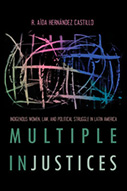Multiple Injustices: Indigenous Women, Law, and Political Struggle In Latin America

Author: R. Aída Hernández Castillo
Publisher: Tucson: The University of Arizona Press, 2016. 328p.
Reviewer: Kathleen M. McIntyre | July 2017
Anthropologist R. Aída Hernández Castillo’s work is a thorough analysis of the limits of multicultural reforms in Latin America for indigenous women. Her book addresses three main themes: the vernacularization of rights discourses; hegemonic and counterhegemonic uses of legality in the context of legal pluralism; and the limits of resistance in the context of neoliberal governance strategies and state violence.
Focusing on Guatemala, Mexico, and Colombia, Hernández Castillo illustrates the tension between neoliberal citizenship and how indigenous women create and renegotiate spaces for organizing as they demand inclusion. In examining the limitations and advantages of communitarian justice, Hernández Castillo argues that indigenous women are able to appropriate these spaces and shape them to better reflect a gendered perspective in the context of new multicultural reforms, whereby they re-appropriate and re-signify issues. While neoliberal reforms ostensibly sought to acknowledge diverse cultures, new exclusions developed as indigenous women sought their place at the negotiating table vis a vis customary law.
Although women play a fundamental role in the process of reconstructing and reapplying indigenous law in their communities, they are also most at risk for sexual violence. Hernández Castillo links sexual violence against indigenous women by the military or paramilitaries as a way to use women’s bodies as a battlefield over neoliberal citizenship. Indigenous women see rape as part of the continuum of state violence against their communities. Although each nation has tremendous diversity within its indigenous communities and conflicts may arise due to political differences and generational diversity, the book argues that indigenous women throughout Latin America can come together based on shared experiences of exclusion and violence.
Hernández Castillo, herself a collaborator in many of the organizations she studies, seeks to privilege non-western epistemologies in order to highlight indigenous women’s organizing. While indigenous women participate in the reconstruction of their own legal systems, they are also apt to “reject tradition and custom” that excludes women from communitarian life (21). Perhaps the strongest contribution of the book is her analysis of a case brought before the Inter-American Court of Human Rights. The case, for which she served as an expert witness, deals with not just the rape of an indigenous Mexican woman, but also the context of death threats to her family and the vestiges of “dirty wars” still facing the Me’ Phaa community.
The author ultimately argues that through the appropriation of discourses on rights, indigenous women are beginning to mold new forms of citizenship in the neoliberal nation-state, while also developing new political identities. She analyzes experiences of indigenous women participating in processes of “reconstruction” of communitarian justice. For example, how do you reconstitute Mayan Law while making it inclusive of women? Communitarian justice is not without exclusions and abuses.
While Hernández Castillo wants the voice of indigenous women to decenter/destabilize western strategies for organizing, the point does become repetitive through the book. The legal jargon might be advanced for undergraduate students, but scholars of Latin American indigenous women will find the book valuable.
Ultimately, this book offers an innovative assessment as to how indigenous women create new meanings around rights, culture, and justice. At its core, the book gets at the inherent contradiction between what constitutes individual rights while trying to also respect the collective rights of a community in the modern nation-state.


